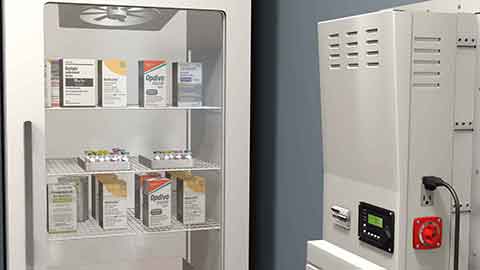Compliance with CDC Regulations for Rheumatology Medications
The proper cold storage of rheumatology medications, especially biologics and disease-modifying antirheumatic drugs (DMARDs), is critical to maintaining their potency and efficacy. As medical professionals, adhering to the Centers for Disease Control and Prevention (CDC) regulations for cold storage is essential to safeguard patient health and ensure optimal treatment outcomes. In this blog, we will explore the importance of cold storage compliance for rheumatology medications and highlight the significance of battery backup power as a solution to ensure uninterrupted cold chain integrity, even during power outages or emergencies.
Understanding CDC Regulations for Cold Storage
The CDC provides guidelines and regulations for the proper storage and handling of temperature-sensitive medications, including those used in rheumatology. These regulations emphasize the maintenance of specific temperature ranges to preserve the effectiveness of medications, ensuring patients receive the intended therapeutic benefits. Failing to comply with these guidelines can lead to medication degradation and reduced efficacy, compromising patient care and safety.
Benefits of Cold Storage Compliance
Adhering to CDC regulations for cold storage compliance offers several benefits in rheumatology medication management:
a. Efficacy Preservation: Proper cold storage helps maintain the potency of rheumatology drugs, ensuring they deliver their intended therapeutic effects and improve patients' clinical outcomes.
b. Patient Safety: Compliance with cold storage regulations reduces the risk of administering compromised medications, minimizing adverse reactions or treatment failures due to ineffective drugs.
c. Legal and Ethical Obligations: Following CDC guidelines demonstrates a commitment to adhering to medical standards and fulfilling legal and ethical obligations to provide quality patient care.
Integrating Battery Backup Power for Cold Storage Compliance
Battery backup power solutions play a crucial role in ensuring cold storage compliance with CDC regulations for rheumatology medications. Power outages can occur unexpectedly, posing a significant threat to temperature-sensitive medications stored in refrigeration units. Integrating battery backup power systems addresses this challenge and provides the following advantages:
a. Uninterrupted Temperature Control: Battery backup power systems maintain a stable environment for cold storage units during power outages, preventing temperature fluctuations and preserving medication integrity.
b. Data Monitoring and Logging: Advanced battery backup systems can record temperature data during power disruptions, aiding healthcare professionals in identifying potential temperature excursions and mitigating risks to medication efficacy.
c. Compliance During Emergencies: In situations where power supply may be compromised due to natural disasters or other emergencies, battery backup power ensures continuous compliance with cold storage regulations, protecting patients' access to vital medications.
d. Reliable Power Supply: Battery backup systems provide a seamless and reliable power source, preventing interruptions in cold storage functionality and safeguarding medication safety.
Conclusion
Complying with CDC regulations for cold storage is essential to ensuring the potency and effectiveness of rheumatology medications, ultimately benefiting patients with chronic inflammatory conditions. By adhering to temperature requirements and implementing proper cold storage protocols, healthcare providers can optimize patient outcomes and deliver the highest standard of care. Integrating battery backup power solutions into cold storage facilities is a vital step in safeguarding the cold chain during power outages and emergencies. By investing in these technologies, medical professionals reinforce their commitment to patient safety, uninterrupted medication access, and compliance with CDC guidelines. Together, cold storage compliance and battery backup power solutions form a formidable partnership in delivering optimal rheumatology care, fostering improved patient well-being, and elevating healthcare standards to new heights.



